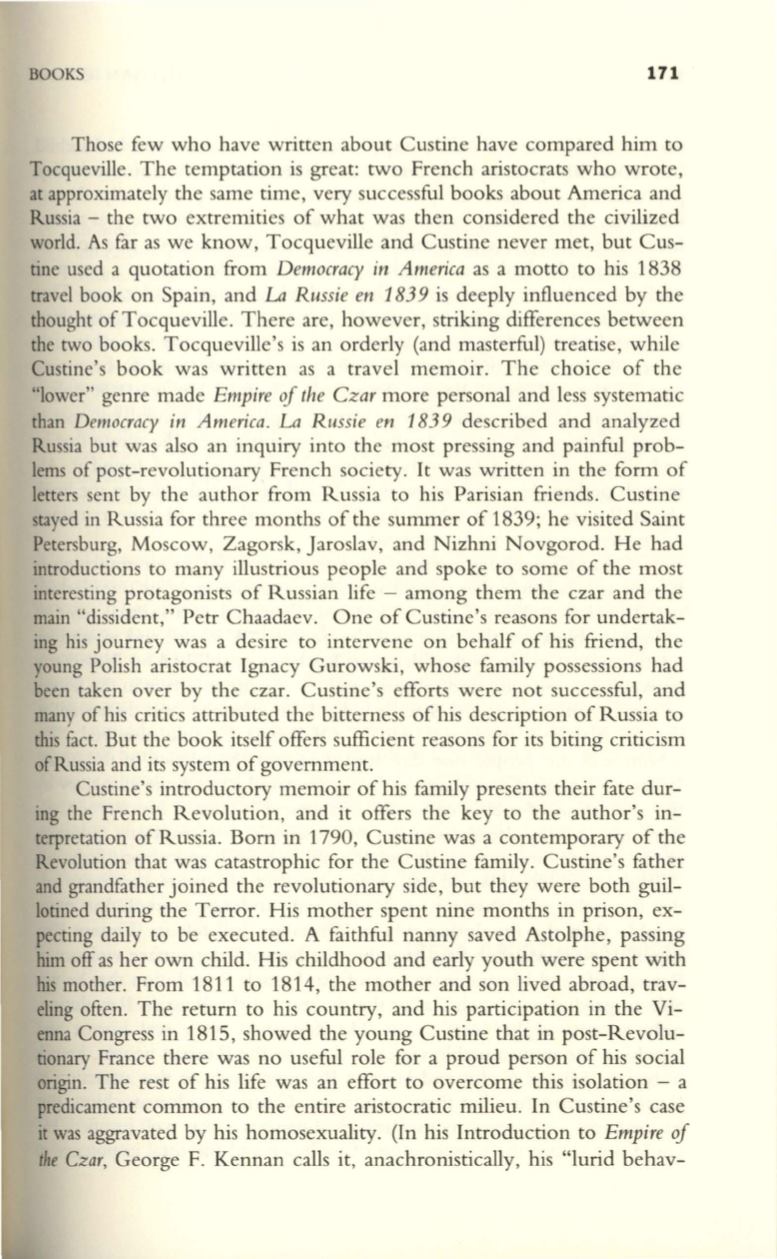
BOOKS
171
Those few who have written about Custine have compared him to
Tocqueville. The temptation is great: two French aristocrats who wrote,
at
approximately the same time, very successful books about America and
Russia - the two extremities of what was then considered the civilized
world. As far as we know, Tocqueville and Custine never met, but Cus–
tine used a quotation from
Democracy in America
as a motto to his 1838
travel book on Spain, and
La Russie en
1839 is deeply influenced by the
thought of Tocqueville. There are, however, striking differences between
the two books. Tocqueville's is an orderly (and masterful) treatise, while
Custine's book was written as a travel memoir. The choice of the
"lower" genre made
Empire of the Czar
more personal and less systematic
than
Democracy in America. La Russie en
1839 described and analyzed
Russia but was also an inquiry into the most pressing and painful prob–
lems of post-revolutionary French society. It was written in the form of
letters sent by the author from Russia to his Parisian friends . Custine
stayed in Russia for three months of the summer of 1839; he visited Saint
Petersburg, Moscow, Zagorsk, Jaroslav, and Nizhni Novgorod. He had
introductions to many illustrious people and spoke to some of the most
interesting protagonists of Russian life - among them the czar and the
main "dissident," Petr Chaadaev. One of Custine's reasons for undertak–
ing his journey was a desire to intervene on behalf of his friend, the
young Polish aristocrat Ignacy Gurowski , whose family possessions had
been taken over by the czar. Custine's efforts were not successful, and
many of his critics attributed the bitterness of his description of Russia to
this fact. But the book itself offers sufficient reasons for its biting criticism
of Russia and its system of government.
Custine's introductory memoir of his family presents their fate dur–
ing the French Revolution, and it offers the key to the author's in–
terpretation of Russia. Born in 1790, Custine was a contemporary of the
Revolution that was catastrophic for the Custine family. Custine's father
and grandfather joined the revolutionary side, but they were both guil–
lotined during the Terror. His mother spent nine months in prison, ex–
pecting daily to be executed. A faithful nanny saved Astolphe, passing
him
off as her own child. His childhood and early youth were spent with
his mother. From 1811 to 1814, the mother and son lived abroad, trav–
eling often. The return to his country, and his participation in the Vi–
enna Congress in 1815, showed the young Custine that in post-Revolu–
tionary France there was no useful role for a proud person of his social
origin. The rest of his life was an effort to overcome this isolation - a
predicament common to the entire aristocratic milieu. In Custine's case
it was aggravated by his homosexuality. (In his Introduction to
Empire of
the
Czar,
George F. Kennan calls it, anachronistically, his "lurid behav-


